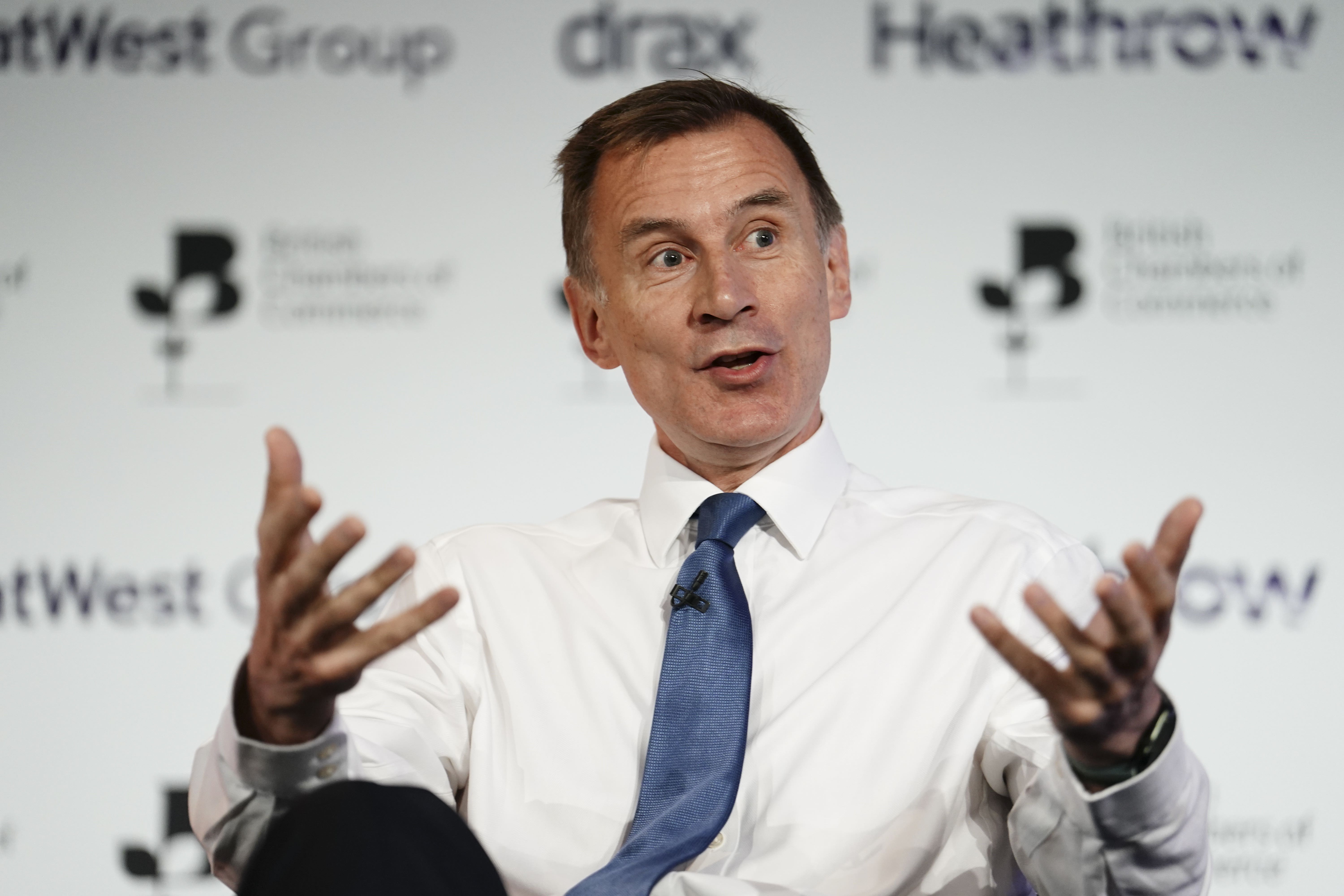Chancellor meets UK regulators amid concerns over price hikes for households
Jeremy Hunt met with watchdog bosses including the CMA’s Sarah Cardell, David Black of Ofwat and Jonathan Brearley of Ofgem.

Your support helps us to tell the story
From reproductive rights to climate change to Big Tech, The Independent is on the ground when the story is developing. Whether it's investigating the financials of Elon Musk's pro-Trump PAC or producing our latest documentary, 'The A Word', which shines a light on the American women fighting for reproductive rights, we know how important it is to parse out the facts from the messaging.
At such a critical moment in US history, we need reporters on the ground. Your donation allows us to keep sending journalists to speak to both sides of the story.
The Independent is trusted by Americans across the entire political spectrum. And unlike many other quality news outlets, we choose not to lock Americans out of our reporting and analysis with paywalls. We believe quality journalism should be available to everyone, paid for by those who can afford it.
Your support makes all the difference.Chancellor Jeremy Hunt has met with the UK’s regulators amid concerns that businesses are not passing on easing cost pressures to consumers fast enough.
He questioned the Competition and Markets Authority (CMA), and the regulators for the energy, water and communications sectors at No 11 Downing St on Wednesday morning over what powers they can use to help lower prices amid accusations firms could be profiteering through price hikes.
Mr Hunt met with bosses including the CMA’s Sarah Cardell, David Black of Ofwat and Jonathan Brearley of Ofgem.
It comes as Britons have witnessed rampant inflation through sharp jumps across a raft of their household bills, at the same time they swallow soaring mortgage costs due to higher interest rates.
Water companies are drawing up plans to increase household water bills by up to 40%, raising concerns from ministers, according to fresh reports by The Times.
Households have witnessed a particularly sharp spike in energy prices during the cost-of-living crisis with the Government’s Energy Price Guarantee currently limiting the bill of a typical house to £2,500.
The average bill for households had been limited to almost half this, at £1,277, as recently as March last year. Nevertheless, bills are set to drop from next month as wholesale price decreases filter through.
Communication regulators at Ofcom are also facing scrutiny over mid-contract price increases of up to 17.3% for millions of mobile phone and broadband customers.
Meanwhile, rises in commodity prices and labour costs have also pushed the cost of food sharply higher, with the latest figures from the Office for National Statistics indicating that food prices in May were 18.4% higher than the same month a year earlier.
Prime Minister Rishi Sunak warned retailers about pricing “responsibly and fairly”, saying household weekly shopping bills had “gone up far too much in the past few months”.
Mr Hunt also confirmed that ministers were talking to the food industry about “potential measures to ease the pressure on consumers”.
He is expected to back a CMA review of food prices and reportedly sees regulators playing a central role in helping curb inflation.
Supermarkets insisted in a committee hearing with MPs on Tuesday that they were not profiteering, with Tesco claiming the group was the “most competitive we have ever been”.
The supermarket chiefs were quizzed by the Business and Trade Committee on allegations that they were using inflation as a cover to raise prices, but told MPs they were not passing on all their costs to shoppers.
The chains added they were not in favour of a cap on the price of basic food items, recently considered by the Government.
The accusations of profiteering have sparked a backlash from the industry, with the British Retail Consortium, the trade body representing the sector, saying there had been a “regular stream of price cuts” by supermarkets despite experiencing “extremely tight” profit margins.
It followed official figures last week that showed Consumer Prices Index inflation failed to ease as hoped in May, remaining at 8.7%.
The Bank of England subsequently raised interest rates to a 15-year high last week in a shock move designed to tame inflation.
Mr Sunak on Sunday urged cash-strapped Britons to “hold our nerve” over high interest rates as he stressed “there is no alternative” to stamping out inflation.
He said “inflation is the enemy” as he defended the Bank’s rate hike, even as it piled pressure on mortgage-holders.
The Chancellor, last week, agreed measures with banks aimed at cooling the mortgage crisis, including allowing borrowers to extend the term of their mortgages or move to an interest-only plan temporarily.